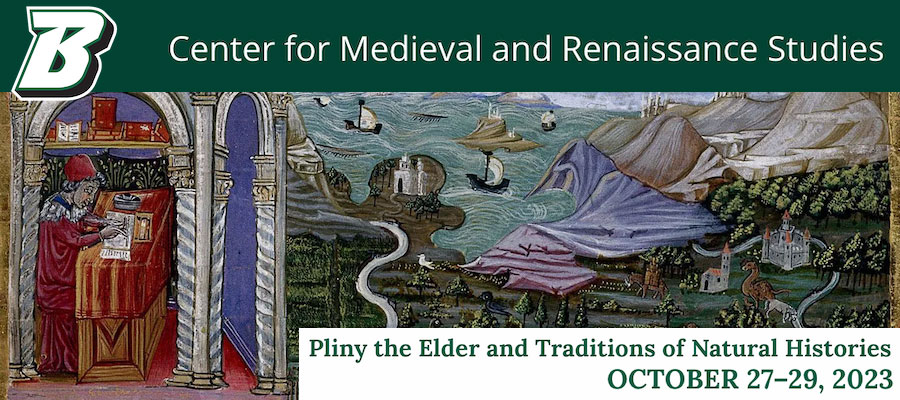Pliny the Elder and Traditions of Natural Histories, Center for Medieval and Renaissance Studies, Binghamton University, October 27–29, 2023
At the bi-millennium of the birth of the Latin author–administrator–statesman–soldier Pliny the Elder, we are reminded that the elder Pliny and his Natural History represent an important opportunity for the study of not only the man and his work, but also the craft and intellectual milieu with which he was engaged. One of Pliny’s key aims was to gather and synthesize other people’s collected knowledge, which may well have been lost altogether without him. His importance both in the arc of writing “natural histories” and in encyclopedism is observable in the reception and transmission of the Natural History in the later Roman and post-Roman worlds. In the spirit of Pliny’s endeavor, this conference aims to explore the traditions that guided the study of the natural world across the first millennium CE and beyond, along with the ways in which “natural historians” carried out their work, and how contemporary scholars approach and utilize the bounty of information his text contains. The conference seeks to bring together researchers interested not only in the Roman author himself, but also in the legacy of the Natural History or the contours of natural philosophical inquiry in premodern societies. Given the persistence of “Dark-Age” stereotypes with regard to scientific inquiry, we hope to focus on connections between Antiquity and the earlier Middle Ages in Byzantine, Islamic, and European cultures, as well as on global approaches that highlight comparisons between the Natural History and texts with similar objectives produced in East or South Asia.
We invite papers and panels from a variety of disciplinary and methodological perspectives on any topic related to the traditions of natural history, including:
- The afterlives of Pliny the Elder in later traditions
- Pliny and medieval and Renaissance medicine and materia medica
- Pliny and materiality, especially when it comes to craft techniques
- Magic, mystic visions, and folk knowledge vs. encyclopedic traditions
- Taxonomies of natural history (within a Plinian tradition or outside of it)
- Cooking the books–experimental archaeology based on natural history texts
- Pliny and manuscript traditions in various languages (Latin, Arabic, etc.)
- Environmental preoccupations of the premodern past
- Visualizing natural history
- Particular themes in natural histories (e.g., art, science, philosophy, astronomy, animals)
